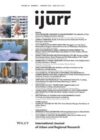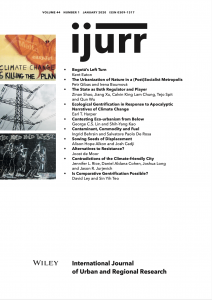Volume 44 Issue 1 January 2020
In This Issue...
Articles
The articles in the January issue present a strong environmental theme: municipal services and management, community and allotment gardening, rural land and property right regulation, climate change narratives, ‘zero-waste neighbourhoods’, solid wastes, mixed-use areas, food justice, ecological and green gentrification, environmental movements, and the climate-friendly city.
First, this issue explores various aspects related to the built environment and nature, such as green space, allotments, agricultural land, solid wastes in cities and circulation across countries, waste-to-energy systems, food and housing.
Second, it examines various narratives and presentations of environmental changes, such as eco-urbanism, food and housing justices, low-carbon lifestyles, apocalyptic narratives of climate change, ‘immunopolitical fantasy’, metabolic transition, non-confrontational ‘alternatives’, and climate-friendly cities.
Third, this issue coheres on governance and politics related to or derived from environmental changes: governance decentralization, counter-neoliberalization, municipal reform, the role of the state, transfer of development rights, local environmental activism, politicization and depoliticization of environmental movements, the political ecology of urbanization, housing justices and urban sustainability.
—Fulong Wu
Interventions
More than 50 years after the back-to-the-city movement was first recognized to be reshaping certain working-class neighborhoods in London, gentrification remains one of the central concerns in critical and comparative urban studies. The two Interventions pieces in the January issue offer new insights into the phenomenon and continue to deepen our understandings of urban transformation and housing justice in cities around the world. The first piece by Jennifer L. Rice, Daniel Aldana Cohen, Joshua Long, and Jason R. Jurjevich exposes the contradiction that climate-friendly urban policies, including transit-oriented development, pedestrian-friendly streets, and urban densification, may be worsening greenhouse gas emissions by attracting more affluent urban residents with higher levels of consumption and larger carbon footprints. By retaining a focus on gentrification and housing justice in studies of urban sustainability, this essay pushes cities to rethink investments in low‐carbon infrastructure that may lead to the displacement of lower‐income and non‐white urban residents with limited environmental benefits. The second piece by David Ley and Sin Yih Teo uses the study of gentrification to continue to probe the limits of planetary urban studies. Responding to an earlier Interventions collection questioning the relevance of gentrification as a framework for explaining urban transformations in Hong Kong, Ley and Teo attempt to bridge what they characterize as a dualism between universalizing urban theory and an emphasis on regional specificity. Situating gentrification at the centre of this inquiry, this essay continues to push on this fundamental schism in global and comparative urban studies and offers suggestions for how it may be bridged.
—Liza Weinstein
Articles
Bogotá’s Left Turn: Counter‐Neoliberalization in Colombia
Published online on Jan 8th, 2020 | DOI: 10.1111/1468-2427.12855 (p 1-17)
The Urbanization of Nature in a (Post)Socialist Metropolis: An Urban Political Ecology of Allotment Gardening
Published online on Aug 6th, 2019 | DOI: 10.1111/1468-2427.12800 (p 18-37)
The State as Both Regulator and Player: The Politics of Transfer of Development Rights in China
Published online on Jan 14th, 2020 | DOI: 10.1111/1468-2427.12843 (p 38-54)
Ecological Gentrification in Response to Apocalyptic Narratives of Climate Change: The Production of an Immuno‐political Fantasy
Published online on Oct 28th, 2019 | DOI: 10.1111/1468-2427.12842 (p 55-71)
Contesting Eco‐Urbanism from Below: The Construction of ‘Zero‐Waste Neighborhoods’ in Chinese Cities
Published online on Oct 7th, 2019 | DOI: 10.1111/1468-2427.12813 (p 72-89)
Contaminant, Commodity and Fuel: A Multi‐sited Study of Waste’s roles in Urban Transformations from Italy to Austria
Published online on Jan 14th, 2020 | DOI: 10.1111/1468-2427.12880 (p 90-107)
Sowing Seeds of Displacement: Gentrification and Food Justice in Oakland, CA
Published online on Sep 26th, 2018 | DOI: 10.1111/1468-2427.12684 (p 108-123)
Alternatives to Resistance? Comparing Depoliticization in Two British Environmental Movement Scenes
Published online on Jan 14th, 2020 | DOI: 10.1111/1468-2427.12860 (p 124-144)
Interventions
Contradictions of the Climate‐Friendly City: New Perspectives on Eco‐Gentrification and Housing Justice
Published online on Mar 5th, 2019 | DOI: 10.1111/1468-2427.12740 (p 145-165)
Is Comparative Gentrification Possible? Sceptical Voices from Hong Kong
Published online on Jan 14th, 2020 | DOI: 10.1111/1468-2427.12845 (p 166-172)
Book Reviews
Neil Brenner 2019: New Urban Spaces: Urban Theory and the Scale Question. New York: Oxford University Press
Published online on Jan 14th, 2020 | DOI: 10.1111/1468-2427.12881 (p 173-174)
Andy Pike, Peter O’Brien, Tom Strickland, Graham Thrower and John Tomaney 2019: Financialising City Statecraft and Infrastructure. Cheltenham and Northampton, MA: Edward Elgar
Published online on Jan 14th, 2020 | DOI: 10.1111/1468-2427.12882 (p 175)
Vincent Mosco 2019: The Smart City in a Digital World. Bingley: Emerald Publishing
Published online on Jan 14th, 2020 | DOI: 10.1111/1468-2427.12883 (p 176-177)
Brett Story 2019: Prison Land: Mapping Carceral Power Across Neoliberal America. Minneapolis: University of Minnesota Press
Published online on Jan 14th, 2020 | DOI: 10.1111/1468-2427.12884 (p 178-179)
Amita Bhide and Himanshu Burte (eds.) 2018: Urban Parallax: Policy and the City in Contemporary India. Delhi: Yoda Press
Published online on Jan 14th, 2020 | DOI: 10.1111/1468-2427.12885 (p 180)
Guillermo Jajamovich 2018: Puerto Madero in Motion [Puerto Madero en Movimiento]. Buenos Aires: Teseo
Published online on Jan 14th, 2020 | DOI: 10.1111/1468-2427.12886 (p 181)
Issues in this volume
January 2020
March 2020
May 2020
July 2020
September 2020
November 2020

